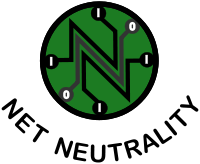The DC circuit court struck a stinging blow to any thoughts about so-called “Net Neutrality” when it overturned the FCC’s attempts to force Comcast the abide by its rules regarding internet access. The three-judge panel ruled that the FCC does not have the authority to force Internet Service Providers (ISP) to give equal access to all its customers. In a nutshell, this means that companies like Comcast, ATT, and Verizon, can filter search engine results and traffic, baning websites for no specific reasons.
So much for net neutrality. Say I type something here that is critical of one of those companies, or any ISP for that matter. With a few keystrokes, my site will disappear. Gone. Just like that. For those that think the internet is this wonderful open global village thing that can spread the word and as a sort of modern-day check and balance system, think again. In this day and age, when corporations have the same rights as people, look for the large ISPs to spend significant lobbying dollars to keep the laws tilted in their favor. I would expect to also see quite a few campaign contributions to legislators that are friendly to large corporations.
There are several letter-writing campaigns, urging the FCC to change its classification of ISPs to a common carrier status, something that would put the ISPs squarely under the FCC’s control. I look upon those with a jaundiced eye. Perhaps the FCC can be convinced to change the rules, this time. What will happen when a new FCC gets appointed? Will those changes stay in effect? The cynical side of me says no.
Independently run media outlets have traditionally acted as a backstop in our society. There are fewer and fewer of those left these days. I will readily acknowledge that the current crop of radio station owners, with some minor exceptions, have left the industry in shambles. Their decision to place profit above all considerations, in spite of the license being granted in the public trust, has decimated newsrooms, reduced staffing, and relegated community involvement to a minor paperwork shuffle at license renewal time. All of this and more have conspired to make radio dull and uninformative. Bland canned formats created and programmed thousands of miles away have ruined local radio flavor. No wonder why people spend money to download from Itunes.
Yet, radio listenership is still high. Radio’s saving grace is it is nearly universal, everyone has a radio, and most households have four or five radios. The technology is time-tested and it works well. Almost every square mile of the US is covered by broadcast radio signals. Some areas are sparse, but there are at least one or two stations that come in. People are used to radio, there is no learning curve, no subscriber fees, and no censorship from a huge faceless mega-corporation. Well, that last part is in theory, anyway. It is almost too much of a coincidence that mega-corporations also own the majority of radio stations too.
Television as a medium is almost gone. Very few people actually watch over-the-air TV, most people get their TV piped into their house via cable. Once again, as those in the NY metropolitan area know, there is no guarantee that the local cable operator will carry a broadcast station, vis a vis the WABC-7 Cablevision dispute from last month.
Newspapers are struggling to stay afloat, even the once mighty New York Times has seen better days.
That leaves us with Radio to fill in the role of un-censored informer. Can they? Will they? It would be a radical departure from the current course and only time will tell.

